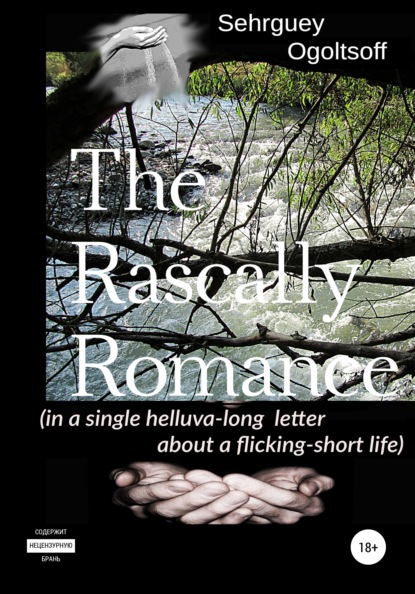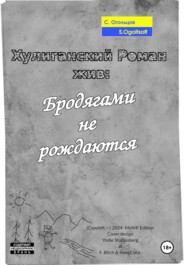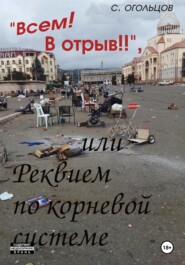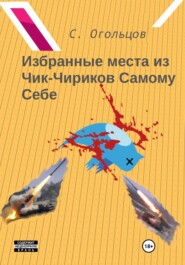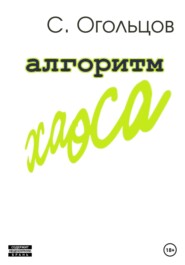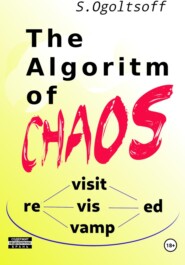По всем вопросам обращайтесь на: info@litportal.ru
(©) 2003-2024.
✖
The Rascally Romance (in a single helluva-long letter about a flicking-short life)
Настройки чтения
Размер шрифта
Высота строк
Поля
I did not want to become a doctor, I never liked the smell in doctors’ offices…
~ ~ ~
At school, Seraphima Sergeevna showed us a plywood frame 10 cm x 10 cm, like, a prototype of a loom with two rows of small nails on two opposite sides. A thick wool thread, stretched between the nails on different sides, served the warp. Motley other threads interwoven across the warp formed rainbow streaks in a miniature rug. Our home assignment was to make a similar frame and bring it for the next lesson, the parents would certainly help us in manufacturing the tool, the teacher said.
However, Dad was not home, he worked the second shift that week, and Mom was busy in the kitchen. Yet, she helped with finding a piece of plywood from an old parcel-box and she allowed taking the saw from the storeroom in the hallway.
I worked in the bathroom pinning the workpiece with my foot to the stool. The saw got stuck so too often, and it kept tearing out small chips and scraps from the plywood, but after long tedious labor efforts a crooked, zigzag sided, square was sawed off.
Putting the tool aside, I got aware of the major problem – how could you ever cut out a smaller square inside the readied one so as to turn it into a frame?
I tried to hack out the square hole within the readied plywood square by use of a kitchen knife and a hammer, but only split the piece cut off with so many ‘a hem!’ in the intense exertion. By the time when I had to go to bed, all of the plywood supply was spoiled in fruitless attempts, and I realized that I was not fit to be a master. The disappointment was so bitter that I raised a mournful howling in the kitchen before Mom.
Lying in the folding bed, I tried not to fall asleep but stay awake till Dad was home after work and ask for his help. However, I overslept his coming, though at some point through overpowering drowsiness I did hear Dad’s voice in the kitchen, giving Mom an angry reply, “What? Again “Kolya”? I know I’m “Kolya” so what?” And I fell back asleep.
In the morning at breakfast, Mom said, “Look at what Dad has made for you to take to school.”
It was a flood of happiness and admiration, when I saw the plywood loom-frame finished with neither a split nor a chip, nor a crack anywhere, and smoothed with sandpaper. The rows of small nails along two opposite sides were aligned straighter than a ruler…
In a year Dad brought home from his work a jigsaw for me, and I enrolled in the group “Skillful Hands” at school. It did not go well with my jigsawing though, because the thin blades kept breaking all too often. Still, I managed to produce a fanciful frame of plywood (with Dad’s help and polishing) for Mom’s photo.
Doing pyrography in pieces of plywood was much easier and I liked the smell of charring wood. Dad brought home a scorcher that he had constructed at his work, and I produced a couple of illustrations to Krylov’s fables copying them from The Book for Future Craftsmen.
However, all that does not mean that my childhood was spent with only handmade playthings around. No, I had a big, store-purchased, Modeling Designer Kit.
It was a cardboard box containing in its separate sections sets of black tin strips and panels full of perforated holes for threading them with small bolts and nuts to assemble building blocks for the construction of different things, like, a car, a locomotive, a windmill, a you-call-it from the booklet of blue-prints that supplemented the Modeling Designer Kit. For instance, it took a couple of months to accomplish a tower crane, taller than a stool it was, and almost all the bolts and nuts in the Kit were used up for it. I would finish the project sooner if not for Sasha’s unwelcome insistence on his partaking in the construction efforts…
The costume of Robot for the New Year matinеe about the Christmas Tree in the school gym was made by Dad. Mom found its design in The Working Woman magazine, which also was every month dropped into the mailbox on our entrance door.
When finished, the costume looked like a box of a thin but sturdy one-layer cardboard. Two holes in the box’s sides were used for keeping your arms outside and the whole construction, when put over the shoulders, reached down to the crotch. The brown cardboard body of Robot was decorated with “+” and “–” on the chest, left to right, same way as markings in flat batteries for flashlight.
Inside the box, there also was a battery but more powerful, the Czech “Crown”, and a small switch. Clicking that secret switch turned on and off the light-bulb nose in the other, smaller, box which served the Robot’s head and fully covered my head, like a knight’s helmet. The two square eyes cut on each side from the nose-bulb in the Robot’s face allowed for seeing from within the box how and who with you were walking about the Christmas Tree…
~ ~ ~
Taming coy hope, I asked at the Detachment’s Library if they’d allow me to choose not from the books returned into the stacks on the librarian’s desk, but rather from those on the shelves. Yes, they said I could do that, yes. O, what an unbound joy beyond description I had to modestly keep in check!.
To the right from the librarian’s desk, towered the wall of The Complete Collection of Works by V. I. Lenin, the shelves started near the floor and rose in tiers to the ceiling, bearing dense unified ranks of volumes different only with the hue of blue in their covers, which depended on the year of edition—the earlier, the darker.
Multi-volume rows of works by Marx and Engels in brown bindings paneled the wall opposite to that of blue, and the shelves of Stalin’s writings, fewer but in taller volumes, screened the shorter wall by the door.
Dense lines of weighty, never opened books with embossed golden letters and numbers in their spines, enshrining countless lines between their heavy covers with the authors' convex relief portraits on the lid-like front ones…
However, there was a narrow cleft in the blue wall—the passage to that part of the Detachment’s Library where, forming a maze of narrow passages, stood shelves with the books of varying degree of wear. The books by Russian writers ranked alphabetically—Aseev, Belyaev, Bubentsoff…; the authors from abroad kept to the same order under inscriptions of their countries’ names—American literature, Belgian literature…; or under the branch they belonged to—Economics, Geography, Politics…
In the maze’s nooks, you could also come across multi-volume collections: Jack London, Fennimore Cooper, Walter Scott (for all my persistent searches I never found among his works a novel about Robin Hood, but only about Rob Roy).
I loved wandering in the condensed silence of the passages between the shelves, taking, now and then, from as far above as allowed my height, one or another book to consider the title and put it back. In the end, pressing the chosen couple to my chest, I returned to the librarian’s desk. Sometimes she put aside one of the books I brought, saying it was too early for me to read…
Once, meandering thru the treasury labyrinth, I suddenly farted. What an embarrassment! Though the sound was not very loud, yet, in case it reached the librarian’s desk thru the wall of Marxism-Leninism classic writers, I tried to iron the wrinkles out by issuing pensive blurblabs that distantly resembled the pesky escaped noise, but now it sounded more like innocent fancy of a boy promenading in the narrow stack passages, for whom reading of certain books was yet too early.
And so I diddled with my lip claps until one of the camouflaging farts turned out so successful, natural and rolling, that simply mortified me, if the first, unintentional, breaking of wind might have been missed, the counterfeit sounded too convincing.
(….as your mother’s mother would likely put it: “Kept fixing until mucked up.” She liked to use Ukrainian bywords in her speech…)
After the New Year holidays, the stack of subscriptions they dropped in the mailbox on our door got thicker by the addition of The Pioneer Pravda. Of course, I still was only an Octoberist, but at school they told us that we already had to subscribe to that newspaper and in any other way prepare ourselves to become pioneers in the future.
Handing me The Pioneer Pravda, Mom said, “Wow! They started to deliver a newspaper for you like for an adult.” I felt pleased with getting admitted to the world of grown-ups, at least from the postal point of view. And I kept reading the newspaper all day long. Each and every line printed in its four pages.
When the parents returned from work in the evening, I met them in the hallway to proudly report that I had read all, all, all of it!. They said, “Good job!”, then hung their coats behind the cotton curtain in the corner, and went over to the kitchen.
You can’t help feeling disappointment when paid for all your pains with a polite disinterested indifference. Like, a hero after a life-and-death battle with Gorynich the Dragon to free a beautiful captive is nodded off with her fleeting “Good job!” instead of the regular kiss on the sugar-sweet mouth. Next time he would think twice if the scrap was worth the while, after all.
Thus, never again I read The Pioneer Pravda entirely—from its red title, with the statement of the printed organ affiliation, down to (and including too) the editorial office telephone numbers and street address in the city of Moscow…
The omission of desired and deserved reward incites to the restoration of justice. And the following morning I readily forgot Mom’s instruction that 3 spoonfuls of sugar were absolutely enough for 1 cup of tea. At that moment, I was alone in the kitchen and, while adding sugar to my tea, I got distracted by considering the frost patterns in the kitchen windowpane, which was the reason why the count of the added spoonfuls was started not with the first one. That mistake somehow coincided with a slight negligence and instead of a teaspoon, I loaded sugar with a tablespoon… The resulting cloy treacle was good only for pouring it into the sink. And that became another lesson to me – filched pleasures are not as sweet as might have been expected…
The fact of having read an issue of The Pioneer Pravda so exhaustively inflated my self-confidence and at the next visit to the Detachment’s Library, from the shelf of French literature, I grabbed a weighty volume with a bouquet of swords in its cover, The Three Musketeers by Dumas-perе. The librarian, after a moment’s hesitation, registered the book in my reader-card and I proudly carried the bulky booty home.
The big sofa somehow didn’t seem appropriate for reading such an adult book, so I took it to the kitchen and spread open on the oil-clothed tabletop. The very first page, full of footnotes informing who was who in France of the XVII century, felt like pretty complicated stuff for reading. But it gradually got in the groove and by the scene of D’Artangan’s saying goodbye to his parents, I already figured out by myself the meaning of the abbreviated words “Mr.” and “Mrs.”, which were absolutely absent from The Pioneer Pravda…
Later that winter, Mom decided that I needed to get my squint corrected because it was not right to leave it as it was. Before she said so, I had never suspected I had anything of the sort.
She took me to the oculist at the Detachment’s Hospital, and he peeked into my eyes thru the narrow hole in the dazzling mirror circle that he wore raised to his white cap when not used. Then the nurse dropped some chilly drops into my eyes and told me to come next time alone because I was a big boy already and had just learned the way to their office.
Going home after the next visit, I suddenly lost the sharpness of vision—the light of bulbs on lampposts along the empty winter road turned into blurred yellow splotches and at home, when I opened a book, all the lines on the page were just unreadable dimmed strings. I got scared but Mom said it was okay only I had to wear glasses, so for a couple of following years I used some plastic-rimmed gear.
(…my eyes were straightened and made keep parallel when looking, however, the eyesight in the left one stayed unfocused. At checks by oculists, I cannot see their pointer or finger touching the check chart. Yet, as it turned out, you can live your life with just one working eye.
The squint was got rid of but ever since the expression in my eyes doesn’t match, which is easily noticeable in a photo when screening them in turn—the inquiring curiosity in the right eye gives way to a lifeless indifference of the left one.
At times I notice that same discrepancy in close-ups of some movie actors and I think to myself if they have also been treated for a squint, or possibly we all are being spied on by some unknown aliens thru our sinister eyes…)
~ ~ ~
And again came the summer but no volleyball was played anymore. In the volleyball grounds at the foot of the Bugorok-Knoll, they cemented two big squares for playing the game of gorodki. And they even organized a championship there. For two days the tin-clad wooden bats clapped and whipped against the concrete, sweeping the wooden pins of gorodki out the squares towards the barrier of the Bugorok-Knoll bluff side.
As usual, the news reached the big sofa with a snail delay, yet I still was in time for watching the final single combat of the two masters who could, even from the remote position, knock out the most complicated figure in gorodki—”the letter”—with just 3 throws of their bats and didn’t spend more than 1 bat at such figures as “the cannon” or “Anna-girl-at-the-window”.
The tournament was over, leaving behind the concrete squares where we, children, continued the game with fragments of the tin-cuffed bats and chips of the split gorodki pins. And even when the leftovers wore out of existence and the concrete squares got lost in the tall grass, the level grounds by the Bugorok-Knoll remained our favorite meeting place. If going out to the Courtyard you could see no one to play with, the next move was going over to the Bugork-Knoll to find your playmates there…
Besides playing games, we educated each other in the main things to know about the wide world around us. Like, after a nasty fall apply the underbelly of Cart Track to the bleeding scratch on your knee or elbow. And the stalks of Soldier-grass with tiny scale-like leaves were edible, as well as the sorrel but not the “horse sorrel”, of course. Or, say, those long-leaved swamp weeds were also edible when you peeled the green leaves off and got to the white core. Here you are! Just chew, you’ll see yourself!
We learned how to see flint from other stones and which of the rest to use for striking against the flint to send forth a trickle of pale sparks. Yes, the hard and smooth flint and the murky yellowish stone give out profuse sparks leaving some strange—both foul and fetching—smell of seared chicken skin.
Thus, in games and chat, we learned the world and ourselves…
“Are you in for Hide-and-seek?”





